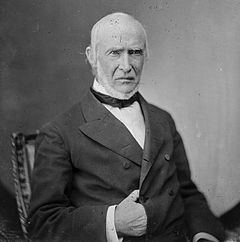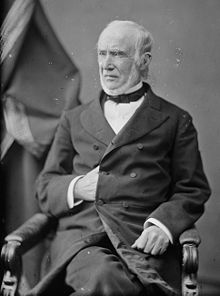- Charles O'Conor
-
Charles O'Conor (Irish: Searlás Ó Conchobhair; January 22, 1804 - May 12, 1884) was an American lawyer who ran in the U.S. presidential election, 1872.
Biography
He was born in New York City, the son of Thomas O'Connor (1770–1855), a member of the O'Conor Don family, who in 1801 emigrated from County Roscommon, Ireland, to New York, where he devoted himself chiefly to journalism.
Charles O'Conor studied law, was admitted to the bar in 1824, and soon won high reputation in his profession. In 1852, he was a presidential elector on the Democratic ticket, voting for Franklin Pierce. He was United States Attorney for the Southern District of New York from 1853 to 1854. In politics an extreme States' rights Democrat, he opposed the response with force to attacks by rebels on United States military institutions. After the American Civil War he became senior counsel for Jefferson Davis on his indictment for treason. These facts and O'Conor's connection with the Roman Catholic Church affected unfavourably his political fortunes.
In the U.S. presidential election, 1872, O'Conor was nominated for the presidency by the "Bourbon Democrats" or "Straight-Out Democrats", who refused to support Horace Greeley, and by the "Labor Reformers". He declined the nomination but received 21,559 votes. The election was won by incumbent President Grant of the Republican Party.
Five other unsuccessful candidates received more electoral votes than O'Conor in the 1872 presidential election:
- Thomas Andrews Hendricks of the Democratic Party. He received 42 electoral votes from supporters of the deceased Greeley.
- Benjamin Gratz Brown of the Democratic Party. He received 18 electoral votes from supporters of the deceased Greeley.
- Charles J. Jenkins of the Democratic Party. He received 2 electoral votes from supporters of the deceased Greeley.
- David Davis of the United States Liberal Republican Party. He received 1 electoral vote from supporters of the deceased Greeley.
- Horace Greeley received 2,834,125 popular votes. Of his 63 electoral votes, 60 were divided among the above four unsuccessful candidates, and three were cast for the deceased Greeley, and subsequently invalidated by Congress.
He took a prominent part in the prosecution of Boss Tweed and members of the "Tweed Ring", and published Peculation Triumphant, Being the Record of a Five Years' Campaign against Official Malversation, A.D. 1871-1875 (1875).
He moved to Nantucket, Massachusetts, in 1881, and died there in 1884; he is entombed in St. Patrick's Old Cathedral, New York.
References
 This article incorporates text from a publication now in the public domain: Chisholm, Hugh, ed (1911). Encyclopædia Britannica (11th ed.). Cambridge University Press.
This article incorporates text from a publication now in the public domain: Chisholm, Hugh, ed (1911). Encyclopædia Britannica (11th ed.). Cambridge University Press.
External links
- Charles O'Conor at the Catholic Forum
- Celebrated Trials: Case of William M. Tweed
- Documents pertaining to a case O'Conor argued
- The New York Civil List compiled by Franklin Benjamin Hough, Stephen C. Hutchins and Edgar Albert Werner (1867; page 579)
Categories:- 1804 births
- 1884 deaths
- United States presidential candidates, 1864
- United States presidential candidates, 1872
- American people of Irish descent
- American Roman Catholics
- People from New York City
- New York lawyers
- New York Democrats
- United States presidential electors
- O'Conor dynasty
Wikimedia Foundation. 2010.


